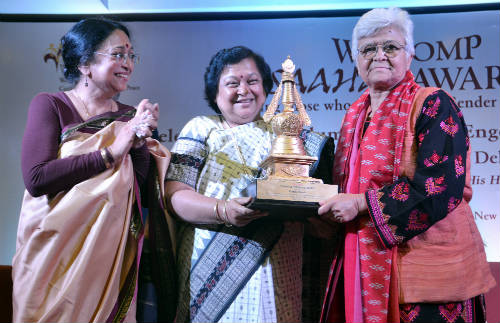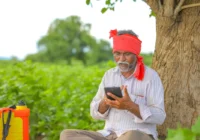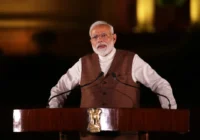NGOs in India are fighting to create an equal society for all, irrespective of their class, caste, gender or race.
Between 2005 and 2014, 2.24 million crimes were reported against women in India. That is 26 crimes reported every hour. In 2015, sexual harassment incidents involving assault, stalking or use of criminal force rose by 2.5%. Kidnapping and abduction of women also increased to 59,277 cases in 2015.
Two years after the brutal gang rape of Jyoti Singh, when the assault on the 23-year-old physiotherapy student in New Delhi that led to her death sparked mass protests across the country, crimes against women in India rose by 9%, to 337,992 cases.
And these are just the reported crimes.
Crimes against women remain largely unreported in India, where gender-based violence is deeply entwined with the social fabric. Many times women who speak up against crime are subjected to social isolation and scorn. There are numerous instances where the police refuse to register a woman’s complaint.
And this is the case in not just India, but across the world. The World Bank estimates that at least 35% of women worldwide have experienced physical or sexual violence, meaning that one in three women in the world has faced violence once in her lifetime. And these crimes are increasing every year.
Technological advancement and economic development have not succeeded in creating a safe environment for women and girls. In fact, technology is now being used to harass and stalk women.
Equal for All
In light of all these problems, what is most necessary is the need for dialogue. And no dialogue on gender-based violence is possible without involving people of all genders. Which is why the need for organizations that speak out on these issues is necessary.
The word “feminism” has acquired a connotation as focusing on the rights of women primarily and the need to create an equal society for both/only men and women. This connotation overlooks the wider struggle of feminism—to create an equal society for all, irrespective of their class, caste, gender or race.

Saahas Awards
To bridge this divide and bring men and other genders into the ambit of feminist issues, the Foundation for Universal Responsibility of His Holiness the Dalai Lama established Women in Security, Conflict Management and Peace (WISCOMP). WISCOMP intends to build a culture of coexistence and non-violence that is gender sensitive and inclusive. To date, it has organized numerous capacity-building workshops and developed curriculums to promote values of plurality and self-reflection in educational spaces.
WISCOMP’s underlying premise, which makes it different from other organizations, is that not all all men subscribe to patriarchal domination and some understand that living with privilege can intoxicate them with wrong ideas. To create awareness about the need for gender sensitivity and combat gender-based violence, the organization held a Saahas Awards ceremony on March 16th to honor the courage of men, women and transgenders who have stood up against gender-based violence in India.
Dr. Meenakshi Gopinath, ex-principal of Lady Shri Ram College for Women (LSR) and the founder of WISCOMP, began the awards ceremony by releasing a curriculum package, which consists of a photo series called Women Who Write, showcasing the lives of women who fight violence through an interplay of text and image; a toolkit for educators, called Engendering Education; a bibliography compiling online sources, manuals on intervention strategies to resist gender based violence; an audio-visual presentation, Re-imaging Frames of Empowerment’; and a short film, Saahas Ke Chaar Adhyay—Four Chapters of Courage—chronicling the life of four people who won the Saahas Award.
Saahas means “courage” in Hindi. Some stories, like those of Sonia Khatri, addressing harassment in the workplace, or that of Deepa, who fought against domestic violence, truly brought out the belief that there are people who are trying to change things, even if it means making just one crack in the glass ceiling at a time.
WISCOMP also honoured Dr. Santosh Kumar Giri, a transgender, who is fighting the stigma that transgenders should be segregated from the society. Labeled as an “effeminate” man, Santosh was thrown out of her home while still in school and survived rape by four men the same night.
India’s Transgender Persons (Protection of Rights) Bill, proposed in 2016, has a major loophole in the fact that it doesn’t allow a transgender to wholly identify as either male or female. This shows that the rights of transgenders are still under threat from in both the political arena and wider society, making the discussion around gender-based violence even more necessary than ever before.
According to a survey conducted by Swasti Health Resource Center earlier this year, it was found that 4 in 10 transgender people face sexual abuse before they turn 18. Of the 2,169 transgenders surveyed by the NGO, more than half reported cases of emotional violence, while 802 said they had been victims of physical abuse. Some 30% of the respondents were living alone, owing to rejection from their families.
Save the Girl Child
While India has seen phenomenal women like Kalpana Chawla—the first woman of Indian origin to go into space, and Olympic medallists like like PV Sidhu, MC Mary Kom, among others—succeed, there are still few opportunities for women in India’s numerous obscure villages. Barriers such as caste and gender inhibit their opportunities. School dropout rates for girls are still high, despite Prime Minister Narendra Modi enacting Beti Bachao, Beti Padhao—Save the Girl Child and Educate Her scheme.
Social ills like dowry—where the girl’s family has to give the man’s family money before marriage—or child marriage persist despite there being laws against it. This makes the struggle of women and men for equal rights even more incredible. For when one woman or man speaks out, a hundred are empowered. And no discussion around gender can be conducted without the participation of all sections of the society—male, female and transgender.
WISCOMP’s “Shero of Courage” for the day was development and feminist activist, Kamla Bhasin. A poet, gender trainer and author, she wears many caps, yet has just one goal—an equal society. Kamla espouses a brand of feminism many fail to understand: For her, the opposite of patriarchy is not matriarchy, it is an equal society. Bhasin has been spreading her message of equality across the South Asian region since 1979, uniting men and women of the region to stand up against gender-based violence.
Today, only 27% of India’s workforce is female. This is way below the world’s average of 50%. Millions of girls in the country are still denied an education, many are forbidden to go out and play games like their male counterparts can. Many women live an existence that binds them to their misery, and the social framework, which considers every woman bound to her husband or father, makes it even more difficult to break out of that bond.
In these circumstances, women, men and transgenders need saviors who can break the tradition that normalizes violence toward them. They need people like 14-year-old Aarti Meghwal from a village in Rajasthan to tell them that child marriage is wrong and girls have a right to live life as happily as a male child. They need men like Dhanraj Nandpatel who can provide them legal support if they are physically disabled and being sexually abused by a member of their family. They need women like Sonia to tell them that not being harassed in the workplace is their right, not an entitlement.
One doesn’t need to know the term feminism to stand up against gender-based violence. Organizations such as WISCOMP can enable change through their goal to integrate and enable all genders to overcome barriers that impede their success in society.
The views expressed in this article are the author’s own and do not necessarily reflect Fair Observer’s editorial policy.
Photo Credit: pixelfusion3d
Support Fair Observer
We rely on your support for our independence, diversity and quality.
For more than 10 years, Fair Observer has been free, fair and independent. No billionaire owns us, no advertisers control us. We are a reader-supported nonprofit. Unlike many other publications, we keep our content free for readers regardless of where they live or whether they can afford to pay. We have no paywalls and no ads.
In the post-truth era of fake news, echo chambers and filter bubbles, we publish a plurality of perspectives from around the world. Anyone can publish with us, but everyone goes through a rigorous editorial process. So, you get fact-checked, well-reasoned content instead of noise.
We publish 2,500+ voices from 90+ countries. We also conduct education and training programs
on subjects ranging from digital media and journalism to writing and critical thinking. This
doesn’t come cheap. Servers, editors, trainers and web developers cost
money.
Please consider supporting us on a regular basis as a recurring donor or a
sustaining member.
Will you support FO’s journalism?
We rely on your support for our independence, diversity and quality.







